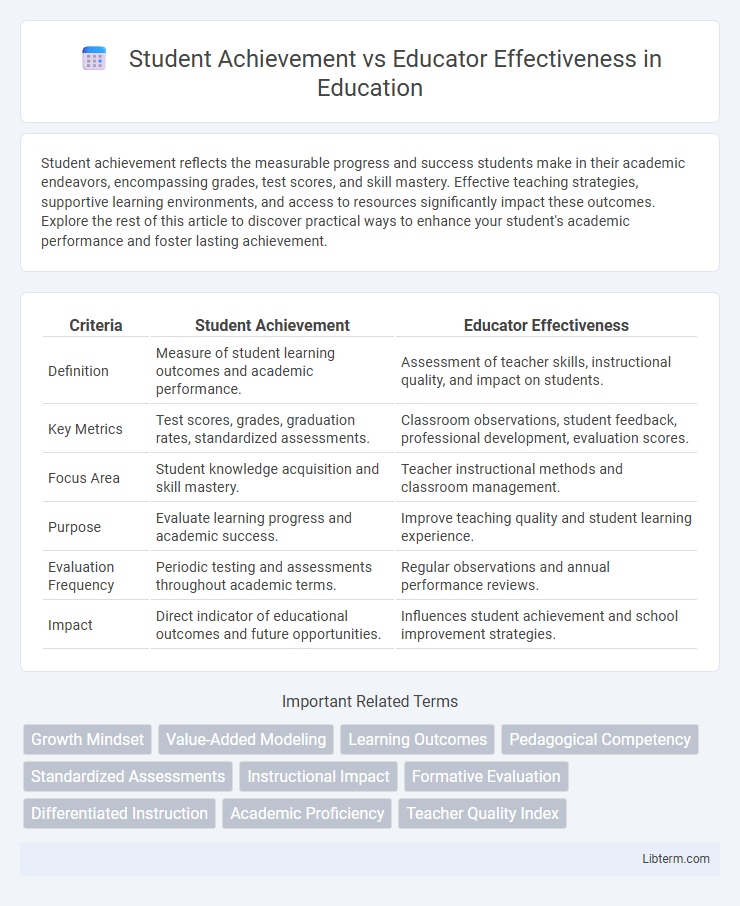Student achievement reflects the measurable progress and success students make in their academic endeavors, encompassing grades, test scores, and skill mastery. Effective teaching strategies, supportive learning environments, and access to resources significantly impact these outcomes. Explore the rest of this article to discover practical ways to enhance your student's academic performance and foster lasting achievement.
Table of Comparison
| Criteria | Student Achievement | Educator Effectiveness |
|---|---|---|
| Definition | Measure of student learning outcomes and academic performance. | Assessment of teacher skills, instructional quality, and impact on students. |
| Key Metrics | Test scores, grades, graduation rates, standardized assessments. | Classroom observations, student feedback, professional development, evaluation scores. |
| Focus Area | Student knowledge acquisition and skill mastery. | Teacher instructional methods and classroom management. |
| Purpose | Evaluate learning progress and academic success. | Improve teaching quality and student learning experience. |
| Evaluation Frequency | Periodic testing and assessments throughout academic terms. | Regular observations and annual performance reviews. |
| Impact | Direct indicator of educational outcomes and future opportunities. | Influences student achievement and school improvement strategies. |
Understanding Student Achievement and Educator Effectiveness
Student achievement is measured by academic performance, growth metrics, and mastery of standards, reflecting a student's ability to meet learning goals. Educator effectiveness is evaluated through classroom observations, student feedback, and student learning outcomes, indicating a teacher's impact on educational progress. Understanding both factors requires analyzing standardized test scores, formative assessments, and instructional quality to improve overall educational success.
Key Metrics for Measuring Student Success
Key metrics for measuring student success include standardized test scores, graduation rates, and college enrollment statistics, which directly reflect student achievement levels. Educator effectiveness is often assessed through classroom observations, teacher evaluations, and student growth measures, providing insights into teaching quality. Combining these metrics offers a comprehensive view of both student learning outcomes and instructional impact.
Defining Effective Teaching Practices
Effective teaching practices center on clear instructional strategies, formative assessments, and strong student-teacher relationships that directly influence student achievement data. Educator effectiveness is measured through classroom observations, student growth metrics, and feedback mechanisms designed to enhance instructional quality. Emphasizing evidence-based methods such as differentiated instruction and active learning fosters an environment where student outcomes and educator performance align closely.
The Interplay Between Teaching Quality and Student Outcomes
Research shows a strong correlation between educator effectiveness and student achievement, with quality teaching directly influencing academic performance and engagement. Effective educators employ strategies tailored to diverse learning styles, fostering critical thinking and problem-solving skills that boost student outcomes. Continuous professional development for teachers enhances instructional methods, creating an optimal environment for sustained student success.
Factors Influencing Student Achievement Beyond the Classroom
Student achievement is significantly influenced by factors beyond educator effectiveness, including family socioeconomic status, access to educational resources, and community support systems. Research highlights the impact of stable home environments, parental involvement, and peer influences on academic performance. Addressing these external factors through comprehensive support programs can enhance student outcomes alongside instructional quality.
Assessing Educator Performance: Tools and Challenges
Assessing educator performance involves tools such as standardized student test scores, classroom observations, and student feedback surveys to measure the impact on student achievement. Challenges include accounting for external variables affecting student learning, ensuring assessment validity and reliability, and balancing qualitative and quantitative data. Effective evaluation systems require ongoing teacher support and professional development to align educator effectiveness with improved student outcomes.
The Role of Professional Development in Educator Effectiveness
Professional development plays a critical role in enhancing educator effectiveness by equipping teachers with evidence-based instructional strategies that directly impact student achievement. Ongoing training improves educators' content knowledge, classroom management, and assessment skills, fostering an environment conducive to higher student performance. Research indicates that targeted professional development correlates with significant gains in student learning outcomes across diverse subjects and grade levels.
Data-Driven Strategies to Enhance Student Achievement
Data-driven strategies enhance student achievement by leveraging educator effectiveness through continuous assessment and tailored instruction. Employing real-time data analytics allows educators to identify learning gaps and implement targeted interventions that improve academic outcomes. Integrating performance metrics with personalized teaching approaches fosters a dynamic learning environment that drives measurable student progress.
Bridging the Gap: Aligning Objectives for Students and Educators
Bridging the gap between student achievement and educator effectiveness requires aligning educational objectives that prioritize both learning outcomes and teaching quality. Implementing data-driven instructional strategies and professional development fosters mutual accountability and enhances classroom performance. Collaborative frameworks that connect student progress metrics with teacher evaluations promote a cohesive approach to educational success.
Future Trends in Evaluating Educational Success
Future trends in evaluating educational success increasingly emphasize the integration of student achievement data with comprehensive measures of educator effectiveness, including instructional quality and professional growth. Advanced analytics and artificial intelligence enable personalized feedback systems that link teaching strategies directly to student outcomes, fostering targeted improvements. Emphasis on social-emotional learning and equity metrics alongside traditional academic indicators shapes a more holistic approach to assessing educational impact.
Student Achievement Infographic

 libterm.com
libterm.com